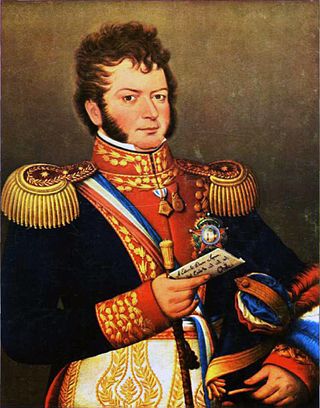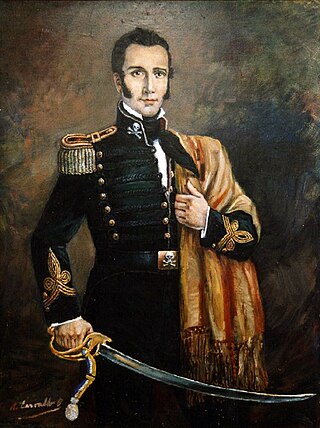This article needs additional citations for verification .(February 2024) |
| |||||
| Decades: | |||||
|---|---|---|---|---|---|
| See also: | |||||
The following lists events that happened during 1817 in Chile .
This article needs additional citations for verification .(February 2024) |
| |||||
| Decades: | |||||
|---|---|---|---|---|---|
| See also: | |||||
The following lists events that happened during 1817 in Chile .
Royal Governor of Chile: Francisco Marcó del Pont (-February 12)
Supreme Director of Chile: Bernardo O'Higgins (February 16-)

Bernardo O'Higgins Riquelme was a Chilean independence leader who freed Chile from Spanish rule in the Chilean War of Independence. He was a wealthy landowner of Basque-Spanish and Irish ancestry. Although he was the second Supreme Director of Chile (1817–1823), he is considered one of Chile's founding fathers, as he was the first holder of this title to head a fully independent Chilean state.

Fernando de Errázuriz y Martínez de Aldunate, also known as Fernando Errázuriz Aldunate, was a Chilean political figure. He served as provisional president of Chile in 1831.

The Battle of Chacabuco, fought during the Chilean War of Independence, occurred on February 12, 1817. The Army of the Andes of the United Provinces of the Río de la Plata, led by Captain–General José de San Martín, defeated a Spanish force led by Rafael Maroto. It was a defeat for the Captaincy General of Chile, the royalist government established after the division of the Viceroyalty of Peru.

Manuel Xavier Rodríguez Erdoíza was a Chilean lawyer and guerrilla leader, considered one of the founders of independent Chile. Rodríguez was of Basque descent.

The royal governor of Chile ruled over the Spanish colonial administrative district called the Captaincy General of Chile, and as a result the royal governor also held the title of a captain general. There were 66 such governors or captains during the Spanish conquest and the later periods of Spanish-centered colonialism. Since the first Spanish–Mapuche parliaments in the 17th century it became an almost mandatory tradition for each governor to arrange a parliament with the Mapuches.

The Chilean War of Independence was a military and political event that allowed the emancipation of Chile from the Spanish Monarchy, ending the colonial period and initiating the formation of an independent republic.

The Crossing of the Andes was one of the most important feats in the Argentine and Chilean wars of independence, in which a combined army of Argentine soldiers and Chilean exiles invaded Chile crossing the Andes range separating Argentina from Chile, leading to Chile's liberation from Spanish rule.

Mariano de Osorio was a Spanish general and Governor of Chile, from 1814 to 1815.

Francisco Casimiro Marcó del Pont y Ángel was a Spanish soldier and the last Governor of Chile. He was one of the main figures of the Chilean independence process, being the final Spaniard to rule as Royal Governor of Chile from 1815 to 1817, when he was deposed and captured by the patriot forces after the Battle of Chacabuco.

Antonio Luis Beruti was an Argentine revolutionary who participated in the May Revolution that started the Argentine War of Independence, and later fought in the Argentine civil wars.

General Fernando Baquedano Rodríguez was a Chilean military and political figure who served in the Chilean War of Independence and the War of the Confederation. Fernando Baquedano was of Basque descent, his ascendants came from Abarzuza.

Spanish Reconquest or just Reconquest is the name of a period of Chilean history that started in 1814 with the royalist victory at the Battle of Rancagua and ended in 1817 with the patriot victory at the Battle of Chacabuco. During this period, the defenders of the Spanish Empire reestablished their dominion in Chile after said country had separated itself from the Spanish Crown, installed its First National Government Board in 1810—the first institution of self-government in Chile, created its First Congress National in 1811 and subsequently elected its first supreme director, Francisco de la Lastra, in 1814.
Vicente San Bruno Rovira was a Spanish military officer, infamous for his cruelty during the Chilean War of Independence.

The Chilean Declaration of Independence is a document declaring the independence of Chile from the Spanish Empire. It was drafted in January 1818 and approved by Supreme Director Bernardo O'Higgins on 12 February 1818 at Talca, despite being dated in Concepción on 1 January 1818. The ceremony of independence was performed on 12 February 1818, the first anniversary of the Battle of Chacabuco.

New Fatherland was a period in the history of Chile that began with the victory of Ejército de los Andes in the Battle of Chacabuco on 12 February 1817 and ended with the resignation of Bernardo O'Higgins as Supreme Director in 1823.

The First Chilean Navy Squadron was the heterogeneous naval force that terminated Spanish colonial rule in the Pacific and protagonized the most important naval actions of in the Latin American wars of independence. The Chilean revolutionary government organized the squadron in order to carry the war to the Viceroyalty of Perú, then the center of Spanish power in South America, and thus secure the independence of Chile and Argentina.

Chile–Spain relations are the current and historical relations between Chile and Spain. Both nations are members of the Association of Spanish Language Academies, Organization of Ibero-American States, Organisation for Economic Co-operation and Development and the United Nations.
The Monument to the Victory of Chacabuco, also known as the Monument to the Battle of Chacabuco, is a monument that commemorates the Battle of Chacabuco, which took place on February 12, 1817. It was designed by Héctor Román Latorre and built in 1971. It is 20 meters tall.

The Legion of Merit of Chile, frequently abbreviated to the Legion of Merit or the Legion, was a Chilean multi-class order of merit established on 1 June 1817 by Bernardo O'Higgins to recognise distinguished personal merit contributing to the independence of Chile or to the nation. Membership of the Legion conferred a variety of privileges in Chile and its members were entitled to wear insignia according to the class conferred. The Legion of Merit of Chile was abolished in 1825.
The following lists events that happened during 1813 in Chile.